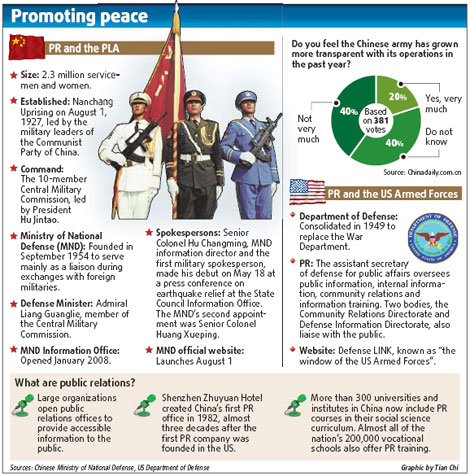"Mao Zedong gave the same importance to posters and leaflets as guns during wartime. Now, public communications of the army with the outside world is crucial," said Senior Colonel Gu Li, dean of the journalism department of the Nanjing Political Academy, a military institution where the training for the 51 officers was held.
"We know the public image of the PLA now depends on the major online news portals. But, honestly, we did not expect the training session to become an international headline."
Researchers believe the army began its public relations work in 1937 when former leader Mao Zedong (1893-1976) held his first interview with a foreign journalist, US writer Edgar Snow, in Yan'an, Shaanxi province. Snow shortly after started work on his influential book Red Star Over China.
Albeit amazing in 1937, that level of highly restricted media access is far from the standards of today.
"For today's public relations, there should be a modern model offering diverse methods," said Dr Jin Miao, author of A Study on Public Affairs of United States Armed Forces, who was also a lecturer for the Nanjing training in March.
Lieutenant Tian is a college graduate and worked for military newspapers before taking his post. His background is a typical one among the new PLA press team, as well as the army's officers on a whole.
His classmate Major Zhang Liwen, a 35-year-old with the PLA's general armament department, is among its most highly educated rising stars. He has a postgraduate degree in Chinese literature from the Renmin University of China in Beijing and has also worked for a military newspaper.
Officers like Zhang have been posted at headquarters of various divisions for years, but he said his daily routine rarely stretched beyond "the basics", such as gathering information for military newspapers, reporting responses to superiors and occasionally answering media inquiries.
"Our work is nothing like what people think of as a 'press officer'," said Zhang. "Our jobs are mainly mission-oriented. There are special arrangements from the higher levels only in the wake of major events or emergency missions."
He said China's armed forces were short on full-time information officers, compared to the US, and explained only two people in his division were responsible for public relations - he and his superior.
"There must be a support team behind an effective defense information network, and each military division or military area should establish an information office as a window of public relations," added Meng Jian, deputy dean of the school of journalism at Shanghai-based Fudan University, who was one of the experts helping to train the PLA's new PR team.
The term "Information Office of the Ministry of National Defense" appeared for the first time in January last year, when it announced a forthcoming visit by Admiral Timothy Keating, the US Navy's Pacific commander. The following month it released details on the military's relief work following a severe storm in south China.
Experts tipped the development as a springboard for a major defense information network like the one employed in the US, where "the PR ability is equal to its combat capability", explained Dr Jin.
Major Colonel Wan Tianbing, 31, with the PLA air force, told China Daily he was already looking for copies of the US Air Force's instructions on public affairs policy and procedure to get some ideas.
Li Xiguang, veteran journalist and executive dean of Tsinghua University's school of journalism and communication in Beijing, has been a vocal advocate of press officers for China's cabinet and ministries. He said: "China is already in an era that demands greater transparency. I have suggested many times to the military they study the models of US and enhance exchanges with them in this field. They must groom a team of highly professional public relations officers."
To be able to learn, a student's mind must be open. And the hardest part of the public relations reform could be altering the mindset of those originally behind the Chinese military's overly guarded thinking.
